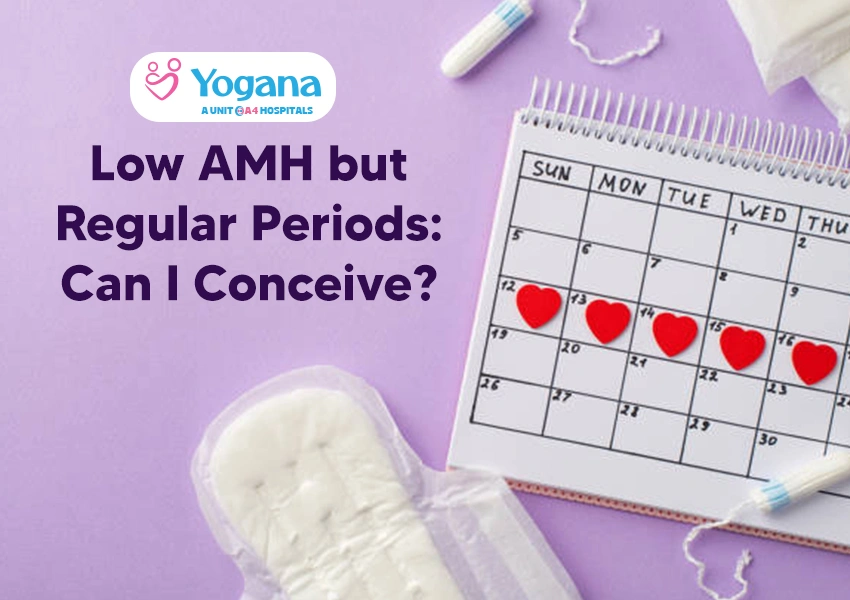Low AMH but Regular Periods: Can I Conceive?
What is AMH?
When
it comes to trying to conceive, especially through fertility treatments, the
determination of AMH levels plays a crucial role. The low levels of AMH in
women can significantly make the natural conception process more difficult. AMH
(Anti-Müllerian Hormone) levels are generally determined through the AMH test
during fertility treatment. The test is done by collecting a sample of blood
from the woman.
AMH
levels in women are the essential indicators of available eggs in their
ovaries. In medicinal contexts, the term is referred to as ovarian reserve.
These AMH levels allow physicians to identify women’s fertility potential at
that particular moment and plan for fertility treatments.
Many
women with low AMH but regular periods wonder about the possibility of being
pregnant. Experts claim that even though the chances of conception are reduced
when compared to women with increased AMH levels, it is still significantly
possible.
This
blog may help you understand how a woman can conceive even with low AMH levels,
and the reasons for decreasing levels.
What are the Reasons for Having Low AMH?
Even
though age is the essential factor for low AMH, other reasons like genetics,
uterine conditions and more are also involved. Let’s discuss it in more detail.
Age
It
is a well-known fact that as women age, the decline in their production of eggs
is evident. Every month during the menstrual cycle, ovaries produce a new set
of follicles, each containing numerous eggs. These follicles get matured, but
only one follicle gets completely matured and released during ovulation.
Sometimes, more than one follicle may be released. It typically depends on the
individual’s hormonal shifts during the menstrual cycle. The unreleased
follicles are then typically taken back by the body.
As
a woman ages, the natural process of producing multiple follicles is
diminished, which denotes low AMH. This makes the older women struggle to
achieve pregnancy.
Genetics
Certain
genetic conditions can cause premature ovarian insufficiency (POI). POI is a
condition where the ovaries of an individual fail to function normally at their
age (typically before 40). As a result, the premature depletion of an ovarian
reserve takes place – meaning, the ovaries tend to produce fewer eggs than
those beyond their age.
Autoimmune Disorders
Autoimmune
disorders like Hashimoto's thyroiditis, type 1 diabetes, rheumatoid arthritis,
and lupus have been associated with impacting ovarian function. These
conditions may impair follicle development and cause damage to the ovarian
tissues through autoimmune mechanisms. This leads to the development of
premature ovarian insufficiency (POI) or reduced ovarian reserve.
Endometriosis
Studies
show that women with endometriosis have experienced a faster depletion of their
ovarian reserve than usual. This is because of the inflammation and scarring
that took place in the ovaries due to the condition, which potentially leads to
reduced fertility.
Hormonal Imbalance
The
changes in physiological or hormonal functions are the potential indicators of
ovarian reserve. The disruption in these functions, especially those associated
with menstrual irregularities, endocrine disorders like thyroid issues and
PCOS, and stress can negatively affect AMH levels.
Chronic Stress
Chronic
stress can indeed affect AMH levels by disrupting the cortisol hormone, which
is essential for reproductive function. High levels of cortisol have a strong
correlation with delicate hormonal balance, poor egg quality, and irregular
ovulation. All these factors lead to fertility issues and lower AMH levels.
Low AMH but Regular Periods: Can I Conceive?
With low AMH and regular periods, the likelihood of natural conception can be difficult but is quite possible. Many experts suggest couples put more effort into achieving a natural conception with diminished ovarian reserve. The process can also take longer time than the average couple. Hence, it is essential to have hope as natural pregnancy is still possible.
Listed
below are some of the key points on how you can achieve the natural conception
with low AMH levels.
Ovulation Still Occurs
Regular
periods are a positive sign of ovulation and fertility. A woman may experience
regular menstrual cycles only when she ovulates regularly. Regular ovulation
and menstrual cycle simply mean that a woman’s body is preparing the uterine
lining for pregnancy each month, even if it doesn’t take place.
Egg Quality Matters
AMH
(Anti-Müllerian Hormone) levels are all about the quantity or number of eggs in
the ovaries. When it comes to successful conception, the quality of them also
matters. Studies show that many couples even with low AMH levels have conceived
naturally, or through fertility treatments like IVF. Focusing on
improving the quality of the eggs and overall reproductive health can
significantly be beneficial to achieve conception.
One Egg is Enough
All
you need is only one healthy egg to get fertilized with the sperm and implanted
in the uterus. Hence, rather than focusing on the quantity of the eggs,
focusing on their quality is highly suggested by numerous fertility experts.
What are the Strategies to Enhance the Chances of Natural Conception?
Following
are some of the strategies from clinical experts to enhance your chances of
natural conception. They are:
Monitor Ovulation
Since
you are menstruating regularly, ovulation is also likely to happen on time.
However, the ovulation days may differ from woman to woman. Monitoring the
exact days that you are ovulating to identify the most fertile days can
significantly improve your chances of conception.
Maintain a healthy weight
Individuals
with both underweight and overweight can possibly have an interruption in their
menstrual as well as ovulation cycles. Hence, maintaining an ideal BMI for your
height is essential for overall health, especially fertility.
Optimize Lifestyle
Focusing
on keeping yourself active through regular workouts, and a balanced
nutrition-rich diet can also be beneficial when it comes to trying for the
natural conception.
Eliminate stress
Eliminating
stress by practising techniques like meditation, yoga, walking, and journaling
can be significantly helpful for enhancing the likelihood of natural
conception. You can also try your favourite hobbies like gardening to distract
yourself from the stress.
Limit too much alcohol and caffeine
According
to the experts, the consumption of excessive caffeine and alcohol can primarily
interrupt sleep patterns. The disruption of sleep can lead to hormonal
fluctuations, especially the reproductive hormones like estrogen and
progesterone. This can largely affect the overall reproductive system,
especially the egg quality.
Explore Fertility Treatments
If
you are still struggling to get pregnant naturally even after trying all the
above-mentioned methods, considering to visit fertility experts like Yogana
Hospital is highly recommended. These experts will be able to analyse the exact
underlying cause of your infertility and provide personalized guidance. They
may also encourage you to try fertility treatments like IUI and IVF. However,
IVF is considered the most effective treatment option with increased success
rates when compared to the IUI technique.
Summary
Lower
levels of AMH do not certainly mean that you will never achieve the conception.
It can be challenging, but not impossible. Fertility experts claim that many
women have achieved conception even with low AMH levels either through
fertility treatments like IVF or naturally. If natural conception is not
happening, considering fertility treatment can be a valuable option.
Frequently Asked Questions (FAQs)
Q: Does it mean my menopause is approaching if the AMH levels are low?
A: The
answer to the question is yes. AMH (Anti-Müllerian Hormone) levels have a
strong association with menopause. Lower levels of AMH are the essential
indicators when it comes to menopause. This is because these hormones are
basically produced by the follicles, which is in the ovaries. The decline of
the hormone production significantly means the decline of the follicles. The
decline in follicles may typically take place as woman ages. Hence, the onset
of approaching menopause.
Q: Are there ways to improve my AMH levels?
A: The
answer to the question is no. There are no considerable ways to enhance the
levels of AMH. However, certain strategies can be beneficial when it comes to
improving the quality of the eggs. The strategies may include maintaining BMI,
quitting smoking and alcohol consumption, eliminating stress, consuming
nutrition-rich foods, and so on. If you are concerned about your low AMH
levels, consulting the most reputed fertility experts is highly appreciated.
Q: With low AMH levels, is it possible to have regular periods?
A: The
answer to the question is yes. A woman can experience a regular menstrual cycle
even though her levels of AMH are low. The levels of AMH (Anti-Müllerian
Hormone) are the essential indicators of the number of available eggs. It does
not primarily mean that no eggs are produced in the ovaries. In simple terms,
only the number of eggs is reduced with the low AMH. Hence, regular
menstruation is quite possible with remaining follicles. At the same time, the
possibility of conception is also quite possible.
Q: Does low AMH levels affect my baby in any way once conceived?
A: The
answer to the question is no. Even though conception is difficult with low AMH,
it does not affect the baby directly. However, experts claim that women with
low AMH have an increased risk of miscarriages, it does not directly cause any
birth defects or medical conditions in the developing baby.
Q: Are ovarian reserve and AMH levels the same?
A: The
answer to the question is no. AMH and ovarian reserve are precisely not the
same. While AMH is a hormone produced by the follicles in the ovaries, ovarian
reserve denotes the number of available eggs in them. Therefore, the decreased
levels of AMH are a sign of decreased ovarian reserve. Similarly, the increased
levels of AMH are a sign of increased ovarian reserve.


